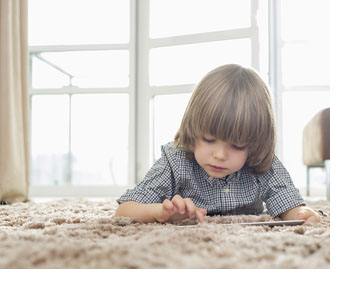
Lack of Free Play among Children Is Causing Harm, Say Researchers
CHESTNUT HILL, MA; August 26, 2011—Hovering helicopter parents who restrict their kids' unstructured play may actually harm, rather than help, children according to the latest issue of the American Journal of Play, a scholarly journal which has gathered a distinguished group of experts to probe the near-extinction of free play and its effects on children and society.
"Remarkably, over the last 50 years, opportunities for children to play freely have declined continuously and dramatically in the United States and other developed nations; and that decline continues, with serious negative consequences for children's physical, mental, and social development," said Guest Editor Peter Gray, a research professor of psychology at Boston College. "This special issue of the American Journal of Play reviews the evidence for the crucial roles of play in children's development and proposes ways we may create a world in which play—especially free outdoor play with other children—is once again a normative part of childhood."
Included in this issue are two articles by Gray, one presenting research that shows a correlation between the decline of free play and the rise of depression, suicide and narcissism in children and teens, and the other highlighting the importance of age-mixed play.
"The Decline of Play and the Rise of Psychopathology in Children and Adults": Gray presents a review of research showing a correlation between the decline of free play in developed nations and the rise of depression, suicide, feelings of helplessness, and narcissism in children, teens, and young adults.
"The Special Value of Children's Age-Mixed Play" : Gray notes that the modern segregation of kids into same-age groups, common in today's classrooms and school yards, may not be optimal for child development. He says that during age-mixed play, older, more skilled participants "provide scaffolds that raise the level of the younger participants' play" and stretch their abilities to higher levels. He cites other studies in which older children were observed exposing younger children to more complex concepts of literacy, math, and sociability. By interacting with younger children, older students develop increased capacities to nurture, lead, and learn by teaching.
Other highlights in the journal are:
"Why Parents Should Stop Overprotecting Kids and Let them Play", an interview with Lenore Skenazy, author of Free-Range Kids: How to Raise Safe, Self-Reliant Children, and Hara Estroff Marano, former Psychology Today editor in chief and author of A Nation of Wimps: The High Cost of Invasive Parenting : Skenazy and Marano point accusing fingers at over-protective parents, over-organized sports, overblown media hype about stranger danger, and the allure of electronic games and social media, which have combined to decrease the amount of free play among today's children. Without free outdoor play, they say, kids are prone to obesity, poor physical health, and an inability to develop social skills.
"Evolutionary Functions of Social Play: Life Histories, Sex Differences, and Emotional Regulation" by Peter LaFreniere, Professor of Psychology at the University of Maine: LaFreniere reviews research about free play from an evolutionary biologist perspective and asserts that evolved patterns of play help children develop strong bones and muscles, promote cardiovascular fitness, and help hone skills of communication, perspective taking, and emotion regulation.
"Marbles and Machiavelli: The Role of Game Play in Children's Social Development" by David F. Lancy, Professor of Anthropology at Utah State University, and M. Annette Grove: The authors review several case studies of children engaged in rule-governed play and conclude that the process of learning rules—and of breaking them and making new ones—promotes gamesmanship, which is theoretically linked to the evolution of human intelligence.
RELATED RESEARCH:
Nearly Half of Preschool Children Not Taken outside to Play by Parents on a Daily Basis
Girls less likely to play outside compared with boys
SEATTLE, WA: April 2, 2012—The American Academy of Pediatrics recommends that pediatric healthcare providers promote active healthy living by encouraging children to play outside as much as possible. Being outdoors correlates strongly with physical activity for children, which is important for preventing obesity in the preschool years and on through adulthood. A new study led by Pooja Tandon, MD, MPH, of Seattle Children's Research Institute found that nearly half of preschoolers in a sample representing four million U.S. children did not have even one parent-supervised outdoor play opportunity per day. The study, "The frequency of parent-supervised outdoor play of U.S. preschool age children," was published in the Archives of Pediatric & Adolescent Medicine.
(Full story . . . )
